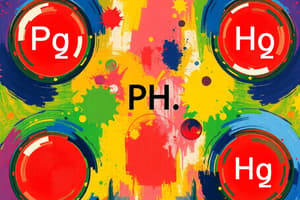Podcast
Questions and Answers
Why should we read safety instructions and use household cleaners containing acids and alkalis in well-ventilated areas?
Why should we read safety instructions and use household cleaners containing acids and alkalis in well-ventilated areas?
- To prevent respiratory irritation or corrosion (correct)
- To create toxic vapors
- To enhance the cleaning power
- To prevent skin irritation
What are the potential risks of mixing household cleaners such as glass cleaner and bleach?
What are the potential risks of mixing household cleaners such as glass cleaner and bleach?
Toxic vapours
What are some foods, drinks, and seasonings that contain acids?
What are some foods, drinks, and seasonings that contain acids?
Soft drinks, vinegar, tea, yogurt, grape, apples, citrus fruits like grapefruit, lemon, and orange, spinach
What are some personal care products, household cleaners, and drugs that contain acids?
What are some personal care products, household cleaners, and drugs that contain acids?
What taste do acids usually have?
What taste do acids usually have?
Acids can conduct electricity. Is this statement true or false?
Acids can conduct electricity. Is this statement true or false?
What is an advantage of using a pH meter compared to universal indicator solution and pH paper?
What is an advantage of using a pH meter compared to universal indicator solution and pH paper?
Alkalis have a ______ taste and a slippery feel.
Alkalis have a ______ taste and a slippery feel.
Match the following acids with their corresponding salts:
Match the following acids with their corresponding salts:
How can neutralization be represented by a word equation?
How can neutralization be represented by a word equation?
Acid rain can help in preventing tooth decay.
Acid rain can help in preventing tooth decay.
During neutralization, the __________ of reactants is equal to the total mass of products.
During neutralization, the __________ of reactants is equal to the total mass of products.
Flashcards are hidden until you start studying
Study Notes
Here are the study notes:
Acids and Alkalis
- Some foods, drinks, and seasonings contain acids, such as soft drinks, vinegar, tea, yoghurt, grapes, citrus fruits, and spinach.
- Personal care products, household cleaners, and drugs can also contain acids, such as body lotion, hair conditioner, toilet cleaner, and aspirin.
- In school laboratories, hydrochloric acid, sulphuric acid, and nitric acid are commonly used.
Safety Precautions
- When handling acids and alkalis, wear safety goggles and gloves to protect eyes and skin.
- Pour acidic or alkaline wastes into appropriate waste bottles.
- Wash hands thoroughly after experiments.
- Never taste acids or alkalis used in the laboratory.
- Do not mix acids or alkalis with other chemicals without permission.
Acid-Alkali Indicators and pH Scale
- Plant extracts can be used as natural indicators to distinguish between acids and alkalis.
- Litmus solution or pH paper can be used to find the pH value of a substance.
- The pH scale measures the acidity or alkalinity of a substance, ranging from 0 to 14.
- A lower pH value indicates a more acidic substance, while a higher pH value indicates a more alkaline substance.
Neutralization
- When an acid and an alkali react, a salt and water are produced, and heat is released.
- The pH value of the solution changes during neutralization.
- The graph shows the change of pH value when dilute sodium hydroxide solution is added to dilute hydrochloric acid.
Applications of Neutralization
- Neutralization has many useful applications in daily life, such as preventing tooth decay, relieving stomach upset, treating insect stings and bites, treating industrial waste containing acids or alkalis, and regulating the pH value of soil.
Corrosive Nature of Acids
-
Acids react with some metals to produce a salt and hydrogen.
-
The reaction between an acid and a metal can be represented by a word equation: acid + metal → salt + hydrogen.
-
Building materials such as marble and limestone react with acids, producing a salt, carbon dioxide, and water.### Chemical Reactions
-
Chalk (a form of limestone) reacts with dilute hydrochloric acid to produce calcium chloride, carbon dioxide, and water.
-
The reaction between an acid and a carbonate can be represented by the equation: acid + carbonate → salt + carbon dioxide + water.
Acid Rain
- Burning fossil fuels in power stations, factories, and vehicles produces sulphur dioxide and nitrogen oxides, which make rainwater more acidic and form acid rain.
- Acid rain corrodes metal objects and building materials, damages plants, and causes harm to aquatic life.
Acids and Alkalis
- Acids and alkalis can be classified into strong acids, weak acids, strong alkalis, and weak alkalis.
- Examples of strong acids include hydrochloric acid, sulphuric acid, and nitric acid, while weak acids include citric acid, ethanoic acid, and carbonic acid.
- Examples of strong alkalis include sodium hydroxide and potassium hydroxide, while weak alkalis include ammonia solution.
Hazards of Acids and Alkalis
- Strong acids and alkalis are more corrosive than weak acids and alkalis.
- Concentrated acids and alkalis are more corrosive than dilute ones.
- When using household cleaners containing acids and alkalis, it is important to read safety instructions, use them in well-ventilated areas, and avoid mixing different cleaners to prevent toxic vapours.
Studying That Suits You
Use AI to generate personalized quizzes and flashcards to suit your learning preferences.




